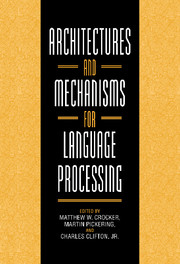Book contents
- Frontmatter
- Contents
- Contributors
- Preface
- 1 Architectures and Mechanisms in Sentence Comprehension
- Part I Frameworks
- Part II Syntactic and Lexical Mechanisms
- Part III Syntax and Semantics
- 9 On the Electrophysiology of Language Comprehension: Implications for the Human Language System
- 10 Parsing and Incremental Understanding During Reading
- 11 Syntactic Attachment and Anaphor Resolution: The Two Sides of Relative Clause Attachment
- 12 Cross-Linguistic Psycholinguistics
- Part IV Interpretation
- Author Index
- Subject Index
11 - Syntactic Attachment and Anaphor Resolution: The Two Sides of Relative Clause Attachment
Published online by Cambridge University Press: 03 October 2009
- Frontmatter
- Contents
- Contributors
- Preface
- 1 Architectures and Mechanisms in Sentence Comprehension
- Part I Frameworks
- Part II Syntactic and Lexical Mechanisms
- Part III Syntax and Semantics
- 9 On the Electrophysiology of Language Comprehension: Implications for the Human Language System
- 10 Parsing and Incremental Understanding During Reading
- 11 Syntactic Attachment and Anaphor Resolution: The Two Sides of Relative Clause Attachment
- 12 Cross-Linguistic Psycholinguistics
- Part IV Interpretation
- Author Index
- Subject Index
Summary
Introduction
In psycholinguistic research, models of sentence processing prevail which explain human parsing preferences with a set of universal principles derived either from general features of the architecture of the human language processor (e.g., Frazier & Fodor, 1978; Konieczny, 1996), or universal features of grammar (e.g., Pritchett, 1992; Gorrell, 1995), or combinations of both (Gibson, 1991). These accounts usually see the human language processor as a modular subsystem (or a set of subsystems, e.g., Frazier, 1990a) of the cognitive machinery (Fodor, 1983). As Pickering, Crocker, & Clifton (this volume) point out, psycholinguists try to uncover the basic architectures and mechanisms of this module, or more pointedly, the natural laws of the human language processor. These laws, i.e., the basic principles of language processing, should be valid across individuals as well as across languages. The simplest interpretation of this approach to sentence processing implies that similar constructions should be parsed in similar ways irrespective of interindividual or interlingual differences.
This approach has been challenged by a series of experiments on relativeclause attachment in sentences like (1), whose results were first published by Cuetos and Mitchell (1988). Cuetos and Mitchell provided evidence for a marked preference to attach the relative clause to the first of the two potential hosts in Spanish, whereas in English, relative clauses were preferentially attached low.
Information
- Type
- Chapter
- Information
- Architectures and Mechanisms for Language Processing , pp. 259 - 281Publisher: Cambridge University PressPrint publication year: 1999
Accessibility standard: Unknown
Why this information is here
This section outlines the accessibility features of this content - including support for screen readers, full keyboard navigation and high-contrast display options. This may not be relevant for you.Accessibility Information
- 17
- Cited by
